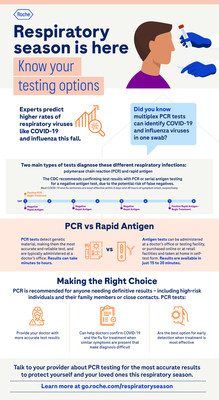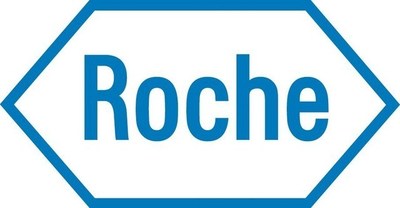New Survey Shows Many Americans Are Confused by Testing Options for COVID-19 and Flu
- The potential for a tripledemic exists, as influenza, COVID-19 and RSV cases rise.
- Two out of three Americans are confused by the differences between PCR and rapid antigen tests in detecting viruses and when to use them.
- It's important to know which test to use, as PCR testing is the best option for early detection, when treatment is most effective.
INDIANAPOLIS, Dec. 15, 2022 /PRNewswire/ -- Historically, respiratory illnesses peak during the winter season. While experts predicted higher rates of respiratory viruses like COVID-19 and influenza this season, respiratory syncytial virus, or RSV, made an early entrance and filled hospital beds, creating the potential for a tripledemic. With at least three respiratory illnesses circulating that may have similar symptoms, it's important to know testing options ahead of holiday gatherings.
According to a new survey conducted by Wakefield Research on behalf of Roche Diagnostics (SIX: RO, ROG) (OTCQX: RHHBY), two out of three Americans are confused by the differences between polymerase chain reaction, or PCR, tests, and rapid antigen tests – the two main types of tests to diagnose respiratory infections. They are likewise confused about when to use them.
However, at least a quarter of those surveyed, many of them parents, do know that the PCR test is the most accurate for detecting the virus that causes COVID-19. Adults with children in their household did slightly better, with
"Before the pandemic, most outside of a clinical setting didn't know that PCR testing was the most accurate in detecting viruses, such as SARS-CoV-2, and there's still room to grow that understanding," said Jamie Phillips Deeter, Ph.D., infectious diseases scientific partner at Roche Diagnostics. "It's important to know that PCR testing is the best option for early detection, when treatment is most effective."
Flu antivirals are most effective within two days of symptom onset. COVID-19 antivirals can be effective within five days of symptom onset if symptoms are present.
Confidence in the PCR test also varied among different demographic groups and based on family composition, according to the survey. A majority of Gen Z (
Many respondents (
Following is some simple guidance on how to differentiate PCR and rapid antigen testing:
- PCR Test: Effective With or Without Symptoms
PCR is the gold-standard in molecular diagnostic testing, and is recommended for anyone who needs definitive results, such as high-risk individuals and their family members or close contacts. The test detects and amplifies genetic material, making it the most accurate and reliable test for respiratory illnesses. It is the best option for early detection, when treatment is most effective due to its ability to detect very small amounts of virus. PCR results can take anywhere from 20 minutes to hours, and tests are usually administered at a doctor's office.
- Rapid Antigen Tests: Most Effective When You Have Symptoms
Rapid antigen tests are useful when results are needed quickly. The tests can be administered at a doctor's office, a testing facility or in the convenience of home. They supply an answer in approximately 20 minutes. However, a rapid antigen test may not detect the virus that causes COVID-19 as early as a PCR test. The Centers for Disease Control and Prevention recommends confirming test results with PCR or serial antigen testing for a negative antigen test, due to the potential risk of false negatives.
"Although respiratory viruses have historically had a defined seasonality, they can cause illness throughout the year," Deeter said. "The ability for viruses to transcend seasons has been particularly evident this year, making it difficult to define the beginning of a traditional respiratory season."
Learn more about testing options year-round in this downloadable, shareable infographic. Visit go.roche.com/respiratoryseason for more information on how to protect yourself and those you care about.
The omnibus survey gauged perceptions of 1,000 nationally representative adults, ages 18 and older, and was conducted online between November 4-13, 2022. Generations are defined as: 18-25 years old for Gen Z; 26-41 years old for millennials; 42-47 years old for Gen X; and 58-76 years old for boomers. Results are subject to sampling variation. The magnitude of the variation is measurable and is affected by the number of interviews and the level of percentages expressing the results. For the interviews conducted in this particular study, the chances are 95 in 100 that a survey result does not vary, plus or minus by more than 3.1 percentage points from the result that would be obtained if interviews had been conducted with all persons in the universe represented by the sample.
Founded in 1896 in Basel, Switzerland, as one of the first industrial manufacturers of branded medicines, Roche has grown into the world's largest biotechnology company and the global leader in in-vitro diagnostics. The company pursues scientific excellence to discover and develop medicines and diagnostics for improving and saving the lives of people around the world. We are a pioneer in personalized healthcare and want to further transform how healthcare is delivered to have an even greater impact. To provide the best care for each person we partner with many stakeholders and combine our strengths in Diagnostics and Pharma with data insights from the clinical practice.
In recognizing our endeavor to pursue a long-term perspective in all we do, Roche has been named one of the most sustainable companies in the pharmaceuticals industry by the Dow Jones Sustainability Indices for the thirteenth consecutive year. This distinction also reflects our efforts to improve access to healthcare together with local partners in every country we work.
Genentech, in the United States, is a wholly owned member of the Roche Group. Roche is the majority shareholder in Chugai Pharmaceutical, Japan.
For more information, please visit www.roche.com.
Roche Diagnostics U.S. Media Relations
Krystina Monaco
(317) 850-7521
krystina.monaco@roche.com
Lori McLaughlin
(317) 463-207-2395
lori.mclaughlin@roche.com
us.mediarelations@roche.com
![]() View original content to download multimedia:https://www.prnewswire.com/news-releases/new-survey-shows-many-americans-are-confused-by-testing-options-for-covid-19-and-flu-301704422.html
View original content to download multimedia:https://www.prnewswire.com/news-releases/new-survey-shows-many-americans-are-confused-by-testing-options-for-covid-19-and-flu-301704422.html
SOURCE Roche








